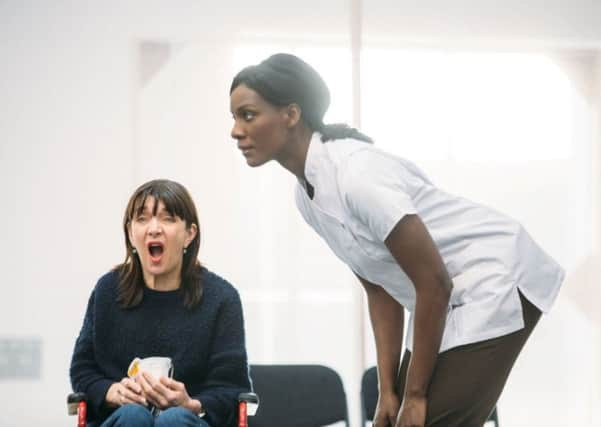Interference: The National Theatre of Scotland vs AI


Once, it was Glasgow’s great WD & HO Wills cigarette factory, opened in 1954 as the very model of a bright, modern postwar industrial space; today, the huge glass-and-brick building in Alexandra Parade has been born again as a vast 21st century office complex, known as City Park. Either way, it seems like a powerful place to explore human ideas of the future, and how it will be shaped by new technologies; and so it’s perhaps not surprising that when the National Theatre of Scotland began the search for its latest site-specific location, it was an empty floor of office-space at City Park that emerged as the ideal setting for Interference, a searching and disturbing triple bill of brand new plays about how the idea of humanity itself is standing up to the onslaught of brilliant new forms of artificial intelligence, and the increasing invasion of our minds, thoughts and choices by the algorithms that drive the internet.
Like many of the most dynamic shows in recent Scottish theatre – from Glasgow Girls to last year’s Fringe smash-hit What Girls Are Made Of – Interference is the brain-child of National Theatre of Scotland associate director Cora Bissett; and the project began to take shape back in 2017, when the world was celebrating the 70th anniversary of the UN Declaration of Human Rights, while everywhere – not least in Britain – these rights seemed to be facing new threats.
Advertisement
Hide AdAdvertisement
Hide Ad“I began to think about all the rights we take for granted,” says Bissett, “and in particular about the way our right to mental privacy is being steadily erased by our growing dependence on the internet, and on various kinds of artificial intelligence. I was wondering what it means to be human, and to try to keep our own autonomy in this new world; I was struck by the view of many ethicists that the technology is simply evolving too fast for any kind of legislation or regulation to keep pace with it. And I knew that the whole subject was so rich, and so varied, that I didn’t want to commission just one play on it; right from the start, I wanted three very different voices, writing from very different perspectives.”
The result is a show that will involve three separate short plays by writers Vlad Butucea, Hannah Khalil and Morna Pearson. Butucea is a Romanian post-graduate student based in Glasgow, who has written a play called Glowstick, about the relationship between an elderly woman facing death, and her robot carer. Palestinian-Irish writer Khalil, now based in London, grew up between her father’s work base in the Gulf and her mother’s family home in Kilkenny, an experience which has shaped an acclaimed series of plays that combine an intense feeling for personal and family life with a profound sense of politics; in her post-apocalyptic play, Metaverse, a scientist who is also a mother strives to create the technology that will enable her once again to experience the real presence of the daughter from whom she is separated. And Darklands, by leading Scottish playwright Morna Pearson, will explore the possible future of human reproduction in a world dominated by a giant tech corporation with its own reproductive priorities. Like almost all Pearson’s work, Darklands is set in a future version of north-east Scotland where people negotiate a changed social landscape through what remains of a rich Doric language and culture. “People don’t often think of science fiction as having that kind of strong local identity,” says Pearson. “So I panicked a bit when Cora first invited me to join the project. But then she said, ‘Please set it in the north-east, and write it in whatever language feels right,’ and after that I just had to feed in the ideas and wait for some characters to start talking to me.”
The trilogy will be performed by the same team of four actors led by the magnificent Maureen Beattie, star of Casualty and Holby City, leading stage actress across the UK, and now only the second woman to become President of the actors’ union, Equity, who is passionate about her Safe Spaces campaign to end bullying and abuse in the entertainment industry.
Beattie appears in all three plays, as the elderly woman in Glowstick, the mother/scientist in Metaverse, and the voice of a Big Brother figure called Moira in Darklands. Although she describes the job of tackling three texts at once as a “big learn,” she’s clearly delighted – after her appearance in the company’s 2012 show Enquirer, about the crisis of print journalism – to be returning to another NTS site-specific show, on a subject deeply engaged with the changing society around us.
“This is actually going to be quite a spectacular show,” says Beattie. “Metaverse, in particular, requires a huge amount of interaction with screens and technology, and it’s a pretty demanding process, rehearsing three plays and getting all that right, in just over a month.
“I’d have to say, though, that the working environment the NTS provides is about as good as its gets, in terms of a team of artists working together positively, in a really relaxed and respectful way, with terrific professional support. Cora creates a great atmosphere in a rehearsal room, very vital, very energised, yet very calm and positive.
“So for me, it’s just great to work on a woman-led project that’s dealing with such an important subject, and forcing us to think hard about what happens to humanity when we become so much part of a digital world. What happens to our heart, our emotions, our spirituality? And how can we defend all that in future? That’s the question these three plays are asking; and it’s fascinating to be involved in a project that begins to explore some possible answers.” - Joyce McMillan
Interference is at City Park, Glasgow, from 16-30 March, www.nationaltheatrescotland.com